 FRIGID Festival 2022 (Part 8)
FRIGID Festival 2022 (Part 8)
The 16th Annual FRIGID Festival is underway in New York City. The FRIGID Festival is an open and uncensored theater festival that gives artists an opportunity to let their ingenuity thrive in a venue that values freedom of expression and artistic determination. Since this year’s performances are both live and livestreamed, there are many chances to see some Indie theater works. 100% of all ticket sales go to the artists. There is a tip jar after each show for the festival.
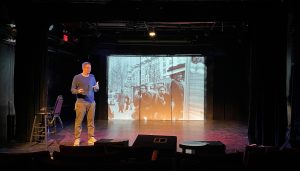
The Lonely Road
At the age of 23, Will Clegg sarcastically finds himself living “everyone’s dream” when he returns to his parent’s house in North Carolina. A combination of events trigger this change notably a girlfriend who ended their relationship. “Instead of being depressed” he plans a road trip. The Lonely Road is his commentary on a impassionate journey.
Photography centers the man and his story. Mr. Clegg is drawn to the images created by Gary Winogrand in 1964. In order to understand why he is so drawn to these photos, he decides to grab fifty rolls of film, borrow a car and pursue his passion. He too will travel the United States and capture America along the way.
Before embarking on that trip he begins to dive further into his now broken relationship with Alison. They met in college when he directed her in a play. Head over heels in love, those first few months were “intoxicating”. A trip to Rome, another actress in another cast and you can guess the rest. Crying, he confesses his transgression. Sparring ensues; half truths are revealed.
On June 26, 2003, the road trip commences. He travels to New Orleans, through Texas and into California. The stories in each section are filled with interesting and often witty details. A friend’s band named Mexico 1910 is “instrumental only”. He eats barbeque with Republicans noting “they’re sweet though”.
In West Texas he begins to listen to a CD by The Postal Service, the last thing Allison gave him before breaking up. A “sad hipster whining” about his ex-girlfriend was his first reaction but this listen speaks to him differently. He comes to realize that now he is the sad hipster whining. A portion of The Lonely Road comes across as that.
Photos he took along the way are projected on the screen and he begins to see a recurring theme. Sharing this perspective accompanied by the visuals is the alluring part of this self-analysis. By the time he gets to Los Angeles, the self-doubts overwhelm and insecurities take command.
He took a picture at a protest of a sign which said “TELL THE TRUTH!” Mr. Clegg proceeds to do just that to himself and then to Allison. By the play’s end there is no resolution. Like life, the present is just another stop along the way to the future. This rendition veers dangerously close to self-pity at times but certainly reflects the emotional woes of an openly heartbroken guy.

Love & Sex on the Spectrum
At 28 years old George Steeves loses his virginity. He has Asperger’s and ADHD which has resulted in his being a late bloomer sexually. Love & Sex on the Spectrum opens with a short reenactment of a painful recollection. “Porn Hub made this all look so simple,” he quips.
Anal penetration is compared to a nasal COVID test as one is not sure how deep it would go in the first time it happens. The material is blunt and told in a lighthearted and jokey manner. This play is described as “an atypical romantic comedy”. That is true.
The tale concerns one man’s sexual awakening from his first orgasm in twelve years to becoming a dating app addict. Amusingly these hookups are given names of boy band singers. His “higher than average intellectual ability coupled with impaired social skills” inform his dating tendencies which cover men of many ages and decades.
After a series of casual sex stories (“swipe left, next date”), the monologue turns to his search for identity. He grew up in a stereotypical WASP family with no talking about sex or emotions. At school they called him gay. “He’s more Golden Girls… I’m Designing Women“. There is an abundance of energy and enthusiasm in the performance which does help elevate the telling from just being a raunchy yet well-intended coming out narrative.
“I kissed over two hundred guys. I was hoping that one of them would be my Prince Charming”. Mr. Steeves’s chronicle turns introspective once the wild oats are sowed. He does get serious before inserting another punchline such as “you’ve never lived until you’ve been to a gay pool party”. Love & Sex on the Spectrum is straightforward and direct, rambling and unfocused, more than a trifle silly and a niche entertainment. The messaging about loving yourself, on the other hand, is universal.

StarSweeper
Sergeant Riley is 532 million kilometers from Earth. A lost crew of humans is missing somewhere and she petitioned to navigate a second search team. Presented by Team Theatre, StarSweeper is a peek into her five year solo mission also known as a “half decade of utter and complete solitude to look forward to”.
The year is 2448. The USS Copperfield is broadcasting on all frequencies searching for a distressed vessel. Our plucky heroine is making the best of the situation. She tries exercise. Bourbon “looks a lot like sweet tea”. She is holding on against hope in the void of space. But it can be dullsville at times. “The thing about astrofood is that it gets pretty boring after a few years”.
Some jokes tickle the funny bone. Riley has an onboard computer friend like Hal from 2001: A Space Odyssey. Time passes and there are problems to deal with of varying importance. A dental issue results in a tooth extraction. Danger lights will blink red. The worries intensify “until the oxygen runs out and the temperature regulators turn off”. Abject fear about floating around for all eternity results in a declaration: “I just want a hug”.
Humanity is considered within the storytelling of StarSweeper. An archeological observation about the discovery of a mended broken bone on a skeleton points the way. There is thoughtfulness in the writing and a winning guide who does not shy away from looking goofy.
Mikeala Duffy has created a interesting scenario which is especially suitable for a small theater environment. Recording entries into a mission log is the primary plot device. There could be even more memorable events scattered into this galactic tale to accompany the general narration provided by this do-gooder. “I’ll just be happy to go home with or without a book deal,” Riley admits when the chips are temporarily down.
Performances at the Frigid Festival are running through March 6, 2022. All shows are performed multiple times at either the Kraine Theater or Under St Mark’s. Tickets can also be purchased for the livestream which was effective and provides these artists more opportunities to be seen and supported.
www.frigid.nyc
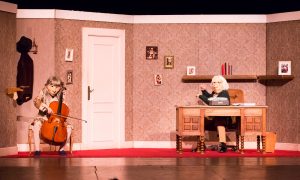

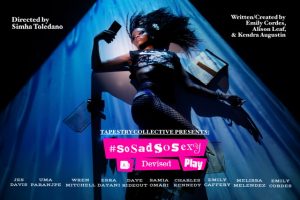

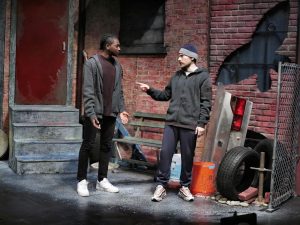

 FRIGID Festival 2022 (Part 9)
FRIGID Festival 2022 (Part 9)
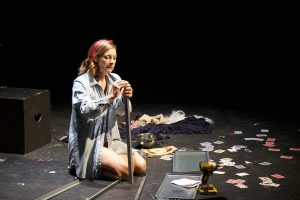




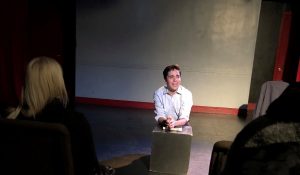
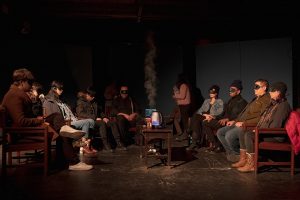




You must be logged in to post a comment.